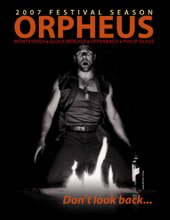Opening Night!

 The night began with an Opening Night Champagne Celebration, to kick off the season. Guests enjoyed light hors d'oeuvres as they mingled and discussed the exciting night ahead.
The night began with an Opening Night Champagne Celebration, to kick off the season. Guests enjoyed light hors d'oeuvres as they mingled and discussed the exciting night ahead.  While patrons enjoyed the sights, sounds, and tastes of pre-opening night festivities, members of Glimmerglass staff were busy behind the scenes making final preparation for the night. Marketing staff manned the Guest Services desk and Gift Shop, Development staff coordinated pre-opera picnics, ushers prepared the house, and the production team focused lights and tested backstage equipment.
While patrons enjoyed the sights, sounds, and tastes of pre-opening night festivities, members of Glimmerglass staff were busy behind the scenes making final preparation for the night. Marketing staff manned the Guest Services desk and Gift Shop, Development staff coordinated pre-opera picnics, ushers prepared the house, and the production team focused lights and tested backstage equipment.Finally the moment everyone had been waiting for arrived. The doors opened, seats were filled, and the orchestra began to tune. However, opening night did not come without its share of drama. Soprano Jill Gardner, who was slated to sing the large role of Eurydice, became indisposed the night before. Fortunately, Glimmerglass makes it a policy to cast covers (understudies) from the Young American Artists Program for every major role in each season's operas, so the show was not cancelled. Soprano Juliet Petrus went on instead and, despite the short notice, gave a masterful performance.
After the opera, singers, staff, guild members, and guests rubbed elbows at an opening night party. General and Artistic Director Michael MacLeod gave an opening address thanking each and every one of the staff, and expressing his excitement for the season ahead.






